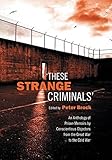These Strange Criminals : An Anthology of Prison Memoirs by Conscientious Objectors from the Great War to the Cold War / ed. by Peter Brock.
Material type: TextSeries: HeritagePublisher: Toronto : University of Toronto Press, [2004]Copyright date: ©2004Description: 1 online resource (524 p.)Content type:
TextSeries: HeritagePublisher: Toronto : University of Toronto Press, [2004]Copyright date: ©2004Description: 1 online resource (524 p.)Content type: - 9781442620803
- Conscientious objectors -- Biography
- Vietnam War, 1961-1975 -- Conscientious objectors
- World War, 1914-1918 -- Conscientious objectors
- World War, 1914-1918 -- Prisoners and prisons
- World War, 1939-1945 -- Conscientious objectors
- World War, 1939-1945 -- Prisoners and prisons
- BIOGRAPHY & AUTOBIOGRAPHY / Criminals & Outlaws
- 355.2/24/0922
- UB341
- online - DeGruyter
| Item type | Current library | Call number | URL | Status | Notes | Barcode | |
|---|---|---|---|---|---|---|---|
 eBook
eBook
|
Biblioteca "Angelicum" Pont. Univ. S.Tommaso d'Aquino Nuvola online | online - DeGruyter (Browse shelf(Opens below)) | Online access | Not for loan (Accesso limitato) | Accesso per gli utenti autorizzati / Access for authorized users | (dgr)9781442620803 |
Frontmatter -- Contents -- Foreword -- Preface -- Document Credits -- Part One: The Great War -- Introduction -- Britain -- Canada -- New Zealand -- United States -- Part Two: The Good War -- Introduction -- Britain -- New Zealand -- Australia -- United States -- Part Three: Cold-War America -- Introduction -- Appendix -- Further Reading
restricted access online access with authorization star
http://purl.org/coar/access_right/c_16ec
In many modern wars, there have been those who have chosen not to fight. Be it for religious or moral reasons, some men and women have found no justification for breaking their conscientious objection to violence. In many cases, this objection has led to severe punishment at the hands of their own governments, usually lengthy prison terms. Peter Brock brings the voices of imprisoned conscientious objectors to the fore in These Strange Criminals. This important and thought-provoking anthology consists of thirty prison memoirs by conscientious objectors to military service, drawn from the United Kingdom, the United States, Canada, Australia, and New Zealand, and centring on their jail experiences either during the first or second world wars or in Cold War America. Voices from history – like those of Stephen Hobhouse, Dame Kathleen Lonsdale, Ian Hamilton, Alfred Hassler, and Donald Wetzel – come alive, detailing the impact of prison life and offering unique perspectives on wartime government policies of conscription and imprisonment. Sometimes intensely moving, and often inspiring, these memoirs show that in some cases, individual conscientious objectors – many well-educated and politically aware – sought to reform the penal system from within either by publicizing its dysfunction or through further resistance to authority. The collection is an essential contribution to our understanding of criminology and the history of pacifism, and represents a valuable addition to prison literature.
Mode of access: Internet via World Wide Web.
In English.
Description based on online resource; title from PDF title page (publisher's Web site, viewed 02. Jun 2024)


